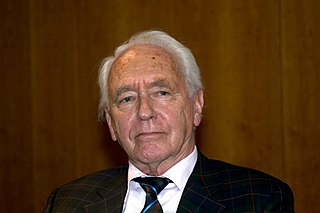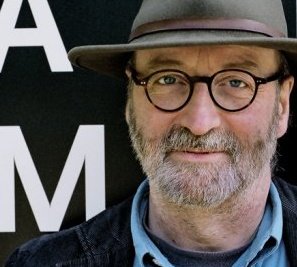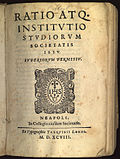
The Aloisiuskolleg is a co-educational, Jesuit (Catholic), University-preparatory school in Bonn-Bad Godesberg, Germany, which includes boarders. It is named for Saint Aloysius Gonzaga. Highly ranked academically, it is considered one of the most prestigious boarding schools in Germany. Since early 2010 the school has been investigated for cases of child abuse.

Saint Blaise Abbey was a Benedictine monastery in the village of St. Blasien in the Black Forest in Baden-Württemberg, Germany.

The Kolleg St. Blasien is a state-recognised private Gymnasium and Catholic school with boarding facilities for boys and girls. It is situated in the town of St. Blasien in the German Black Forest. The school has 850 students, 300 of whom are boarders, and is led by members of the Jesuit order. It is considered to be one of the most prestigious schools in Germany with a rich and long history.

Max Bense was a German philosopher, writer, and publicist, known for his work in philosophy of science, logic, aesthetics, and semiotics. His thoughts combine natural sciences, art, and philosophy under a collective perspective and follow a definition of reality, which – under the term existential rationalism – is able to remove the separation between humanities and natural sciences.

Rev.Otto Faller SJ was Provincial Superior of the Jesuit order in Germany, educator, teacher and Dean at Stella Matutina in Feldkirch, Austria and Kolleg St. Blasien in Germany, professor of patristic studies at the Gregorian University. He was lifelong editor of the works of St. Ambrose. At the request of Pope Pius XII, he contributed to the preparation of the dogma of the assumption of Mary and organized new Papal charity and Papal refugee offices during World War II.

Stella Matutina in Feldkirch, Austria, was a Jesuit school that operated in 1651–1773, 1856–1938, and 1946–1979.
Georg Michael Pachtler was a German Jesuit and educational writer.

Wolf Dietrich Schneider was a German journalist, author, and language critic. After World War II, he learned journalism on the job with Die Neue Zeitung, a newspaper published by the US military government. He later worked as a correspondent in Washington for the Süddeutsche Zeitung, then as editor-in-chief and from 1969 manager of the publishing house of Stern. He moved to the Springer Press in 1971. From 1979 to 1995, he was the first director of a school for journalists in Hamburg, shaping generations of journalists. He wrote many publications about the German language, becoming an authority. He promoted a concise style, and opposed anglicisms and the German orthography reform.
Roswitha Hecke is a German photographer and photojournalist. With content ranging from faces to places, her photographic projects explore the unfamiliar and re-examine the familiar.

Wellingsbüttel Manor is a former manor with a baroque manor house in Hamburg, Germany, which once enjoyed imperial immediacy (Reichsfreiheit). Wellingsbüttel was documented for the first time on 10 October 1296. Since 1937 it has formed part of the suburbs of Hamburg as the heart of the quarter of the same name, Wellingsbüttel, in the borough of Wandsbek. The owners of Wellingsbüttel Manor from the beginning of the 15th until the early 19th century were consecutively the Archbishops of Bremen, Heinrich Rantzau, Dietrich von Reinking, the Barons von Kurtzrock, Frederick VI of Denmark, Hercules Roß, the Jauch family, Cäcilie Behrens and Otto Jonathan Hübbe. In the early 19th century it was the residence and place of death of Friedrich Karl Ludwig, Duke of Schleswig-Holstein-Sonderburg-Beck, the penultimate duke, who was an ancestor inter alia of the present-day British royal family. Wellingsbüttel Manor was elevated to the status of a Danish "chancellery manor" (Kanzleigut). It was then acquired by Grand Burgher of the Free and Hanseatic City of Hamburg Johann Christian Jauch junior (1802–1880), becoming a country estate of the Jauch family. The manor house is together with Jenisch House (Jenisch-Haus) one of Hamburg's best conserved examples of the Hanseatic lifestyle in the 19th century and jointly with the manor gatehouse a listed historical monument. The estate is located on the banks of the Alster River in the middle of the Alster valley (Alstertal) nature reserve.
Wolfgang Schwenke was a German zoologist and entomologist.
Heinz Schilling is a German historian.

Hans-Michael Bock is a German film historian, filmmaker, translator and writer.

The Japanische Schule in Hamburg e.V. is a Japanese international school located in Halstenbek, Schleswig-Holstein, Germany, within the Hamburg Metropolitan Region.
Albert Schreiner was a German political activist and Marxist historian.

Fritz Jöde was a German music educator and one of the leading figures in the Jugendmusikbewegung.

The Gymnasium Theodorianum is a grammar school situated in the historic centre of Paderborn, Germany. Succeeding in the tradition of the cathedral school founded in 799, it is among the ten oldest schools in the world. It continues in the ideals of Renaissance humanism, with Latin taught as the primary foreign language and Ancient Greek offered as an additional subject. The school has produced several leading German political, scientific, religious and military figures. It is known locally simply as the “Theo”.
Gerhard Schricker was a German legal scholar with a focus on intellectual property and competition law. He was a full professor at Ludwig Maximilian University of Munich from 1973 to 2000 and served as Director of the Munich-based Max Planck Institute for Foreign and International Patent, Trademark, and Copyright Law between 1971 and 2003.
The history of the Jews in Hannover began in the 13th century. In 2009, about 6200 people belonged to the four Jewish communities in Hannover.














